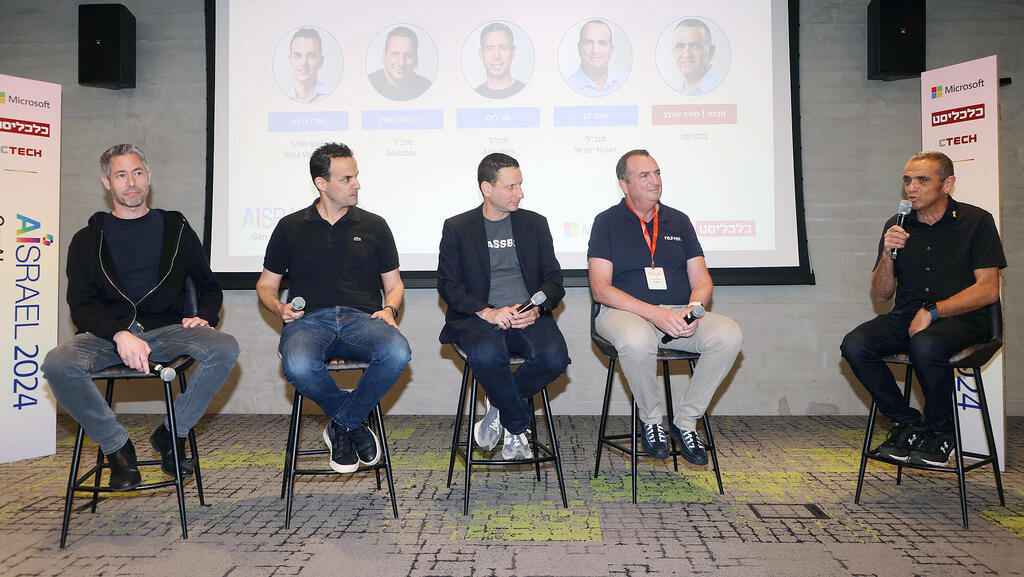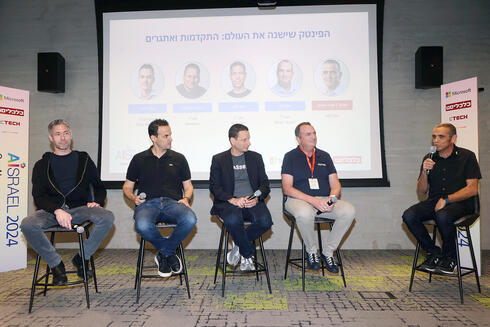
"AI will change all workforce aspects in companies"
Yaron Morgenstern, CEO of Glassbox, was speaking on a panel held at the AIsrael conference. Omry Ben David, general partner at Viola Ventures, referred to the growing gap in investment trends between Israel and the US
"AI will change all workforce aspects in companies. Everyone has access to it and everyone needs to know how to do their job better. It will replace basic skills and move people to deal with what is important, understanding how to use AI engines," said Yaron Morgenstern, CEO of Glassbox, speaking on a panel on fintech held as part of Microsoft and Calcalist's AIsrael conference.
The panel included, alongside Morgenstern, Shemer Katz, CEO of Nuvei Israel, Or Liban, Head of Israel and the Middle East at Airwallex, and Omry Ben David, general partner at Viola Ventures.
Until recently fintech was a hot field, but today less so. However, AI will make it more interesting. How does the industry look today?
Omry Ben David: "My role is to lead the fintech worlds at Viola. There has been a significant decrease in investments in fintech, this is a global and Israeli phenomenon. At the global level, interest rates are rising and the world of fintech is suffering. It is being hurt more than cyber and this is because loans are less attractive. I personally have made one new investment in the last year and a half.
“From the Israeli angle, since the period of the judicial reform and the beginning of the war, the situation has worsened. This is the first time I have experienced in all my years in the industry a situation where there is a gap with the Americans. In America the situation is improving in terms of the rate of fundraising and in Israel we are not experiencing this.
“Regarding the influence of AI on the field, we are in a state of 'hype’ and I think as an investor the focus is on AI as a consumer product. As an investor, if an entrepreneur comes to me and tells me about AI, I first check what is under the hood. To me, AI is not exciting, it is used to accelerate companies."
Yaron Morgenstern, CEO of Glassbox, provided his perspective on the impact of AI: "We work with the largest banks in the world and, of course, in Israel, and we assist them in improving the customer experience, with an emphasis on digital channels. What is most important in this field is strong and correct data. We cooperate with Microsoft and this allows us to work with large banks and allow them to understand their problems in working with digital channels. We enable every employee in the organization to understand the customer - there is a revolution here that is made possible through AI and changes organizations."
Or Liban of Airwallex, provided his angle: "We are in Israel because of product innovation, we are looking at possibilities for partnerships and there is a successful business environment here. I came to the company after 15 years at Google because the technology is constantly changing, it is dynamic and the AI makes it work better. It enables automation and frees up workers' skills for important things.
“For example, the entire process of getting to know the customers used to take a lot of resources - today it is performed faster, better and more accurately. This makes it possible to give a quick and correct solution in real time. And the personalization is also excellent with virtual assistants and chatbots."
Related articles:
Shemer Katz, CEO of Nuvei Israel, you purchased companies here. How did you approach AI?
"We are a leading company in the field of payments. We have a strong technological base in Israel, with 350 employees, billions of dollars have been invested in us and in general there are huge recruitments in Israel - and this indicates the resilience of the industry despite everything," said Katz.
Katz further elaborated: "In the field of AI, I will point out that as a payments company we allow every business in the world to receive money from its customers. Our customers are troubled by two main issues: the percentage of approvals, i.e. how many customers were able to buy; prevention of fraud and not harming legitimate transactions. In these areas, AI is making a real revolution.
“For example, we detect a pattern of fraud in the areas of Internet purchases from an IP address that exists in a different country than the country where the card was issued. We discovered that with some of our customers, there is a blocking of transactions that are real and legitimate. But when we activated AI the process became very efficient. The systems discovered by themselves who is a real and legitimate buyer and blocked fraudulent transactions.
This is an excellent example of a situation where the technology gives customers a substantial upgrade in their businesses in addition to the endless possibility space in the field of Generative AI. Instead of the traditional methods in which the system operators see reports and look for signs of fraud, they talk freely with a micropilot system and the work is very efficient, at the level of receiving answers and making moves within seconds."
